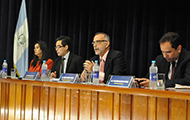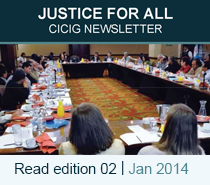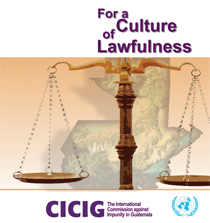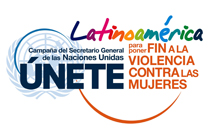PRESS RELEASE 049
CHAMBER ACCEPTS RECUSAL MOTION FILED AGAINST JUDGE ANABELLA CARDONA
Judge of the Seventh Trial Court and President of the Association of Judges
 Guatemala, September 2, 2013. The alternate judges of the Second Chamber of Criminal Appeals, Ramón Francisco González Pineda, Sonia Judith Alvarado López and Frank Manuel Trujillo Aldana, accepted the recusal motion filed against Judge Anabella Esmeralda Cardona Cámbara (judge of the Seventh Trial Court) on the following grounds: "She made statements that brought her impartialness in the case [Fraijanes II] into question". Therefore, the recusal motion was granted.
Guatemala, September 2, 2013. The alternate judges of the Second Chamber of Criminal Appeals, Ramón Francisco González Pineda, Sonia Judith Alvarado López and Frank Manuel Trujillo Aldana, accepted the recusal motion filed against Judge Anabella Esmeralda Cardona Cámbara (judge of the Seventh Trial Court) on the following grounds: "She made statements that brought her impartialness in the case [Fraijanes II] into question". Therefore, the recusal motion was granted.
The Commission filed a recusal motion against the judge based on doubts concerning here impartialness, because she had previously made statements to some sectors of the media in which she criticised CICIG. As a result, the Chamber ordered that she step down from hearing the Fraijanes II case, because her statements had raised doubts over her ability to impartially rule on the matter. In addition, the Chamber ordered that another judge be assigned to hear the case.
Among the arguments used by CICIG to substantiate the recusal motion were the statements made by the Judge in a interview with the radio station Emisoras Unidas on May 29, 2013. On that occasion, the Judge said the following about the Commissioner’s decision to resign: "We, the Association of Judges, believe this decision restores a degree of respect for the rule of law and judicial independence, which have been severely damaged by that institution [...] It would seem like the best time, because, according to rumours, it is largely due to the fact that, as the Association has already insisted, CICIG has a specific mandate and its actions must be comply with it. In spite of this, CICIG has acted beyond the parameters of its mandate."
On April 22, 2012, the Judge said the following to the above-mentioned radio station: "We reject CICIG’s use of media outlets to influence public opinion and thereby pressurize legal decision making by threatening to use smear campaigns against individuals or undermine their dignity."
Impartialness
The right to be tried by an impartial judge or court is a fundamental element of due process. Society perceives a judge's professional conduct to be a determining factor in the credibility of the justice system. Therefore, a judge must fulfill his or her duties without showing favouritism or any kind of prejudice. While judges are hearing a case, they must refrain from making statements that could make people think a case decision has been affected by bias. They must deal with all people correctly and equally (the accused, witnesses, lawyers, etc.), avoiding any kind of discrimination or prejudice.
In this regard, the Inter-American Court of Human Rights (IACrtHR), by way of the judgement it passed on November 20, 2009, stipulated that impartialness requires judges to hear the facts of a case, while subjectively avoiding any prejudice and objectively upholding appropriate guarantees, in order to prevent the person facing trial, and the wider community, from having concerns over a lack of impartialness.
The impartialness of a court requires its members to have no direct interest, clear stance or bias regarding one of the parties. Moreover, they must not be involved in the issue in any way. It is assumed that a person is impartial, unless there is evidence to prove otherwise. As part of ensuring evidence is objective, it must be determined whether or not the challenged judges provided convincing proof to eradicate any legitimate concerns or reasonable suspicions surrounding them.



 Guatemala, September 2, 2013. The alternate judges of the Second Chamber of Criminal Appeals, Ramón Francisco González Pineda, Sonia Judith Alvarado López and Frank Manuel Trujillo Aldana, accepted the recusal motion filed against Judge Anabella Esmeralda Cardona Cámbara (judge of the Seventh Trial Court) on the following grounds: "She made statements that brought her impartialness in the case [Fraijanes II] into question". Therefore, the recusal motion was granted.
Guatemala, September 2, 2013. The alternate judges of the Second Chamber of Criminal Appeals, Ramón Francisco González Pineda, Sonia Judith Alvarado López and Frank Manuel Trujillo Aldana, accepted the recusal motion filed against Judge Anabella Esmeralda Cardona Cámbara (judge of the Seventh Trial Court) on the following grounds: "She made statements that brought her impartialness in the case [Fraijanes II] into question". Therefore, the recusal motion was granted.












